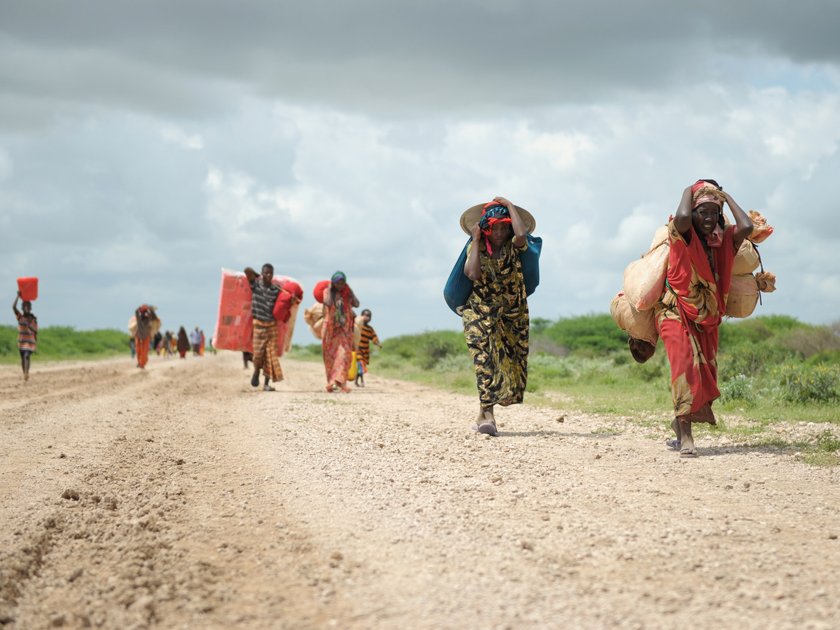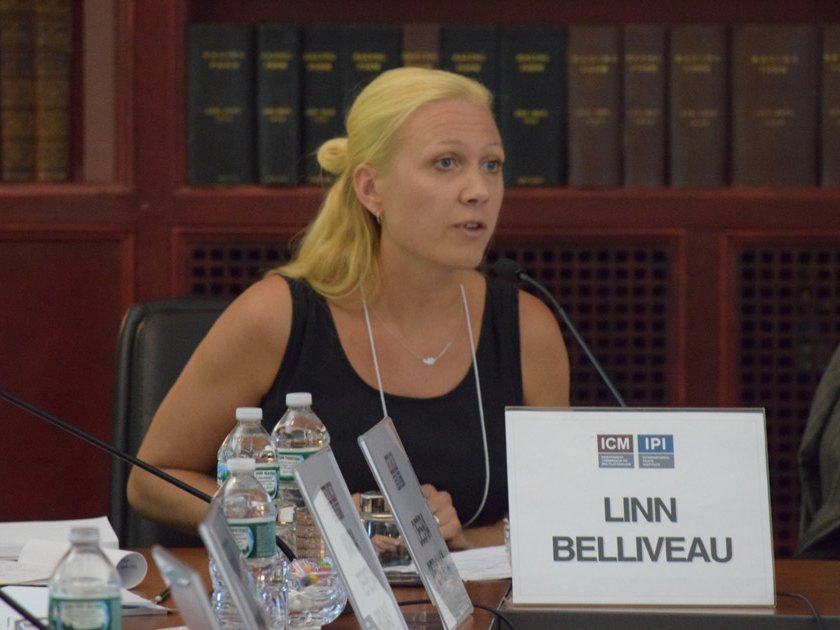Human displacement and migration has always taken place and will continue to do so as long as large parts of the world struggle with war, violence, authoritarian power, and poverty, said Linn Biorklund, Humanitarian Affairs Advisor at Doctors Without Borders. But today, people are fleeing further away from their places of origins and embarking on dangerous journeys managed by smugglers.
“Global solidarity and political will to solve this crisis has been, and continues to be, very low,” she argued, “and consequently there’s inadequate understanding, attention, and response.”
And within the response, the challenge is that the system puts people into boxes to facilitate their access to protection. According to Ms. Biorklund, this produces the opposite result, leaving people who do not fit into a specific criteria with little or no assistance and causing increased levels of suffering.
“The countries neighboring the locations where large displacements are taking place are the ones with the heaviest burden,” she said. “It’s often where the most vulnerable people get stuck in protracted situations, in camps and detentions, and where their vulnerability increases.”
“The needs of the people have to lead any type of humanitarian response…needs cannot be subordinated to political and economic interests,” Ms. Biorklund said. “This also means that providing assistance to displaced populations often needs to happen in parallel with providing assistance to host populations.”
The multilateral system should coordinate the response to the migration crisis and should focus more on the sentiments from communities and civil society on migration, she continued.
“What we’re seeing at the moment is that public opinion is increasingly more critical to this topic…We should try to turn this around to make sure that policies that are implemented and related to migration and immigration focus on minimizing harm rather than creating it.”
Ms. Biorklund spoke to Nadia Mughal of the Independent Commission on Multilateralism via Skype, following the ICM’s retreat on forced displacement, refugees, and migration, held on July 10-11.
This interview has been edited for clarity.
What are the biggest challenges with the global migration crisis?
Some of our largest challenges I would say are first, global solidarity and political will to solve this crisis has been, and continues to be, very low and consequently there’s inadequate understanding, attention, and response. It has improved, but still we have so much more to work on.
The second one is the current system on how to respond to crisis. Here, I would specifically point out that you have a framework to respond to displacement and to refugee crises, linking to legal categorization, which puts people into boxes to facilitate their access to protection and assistance. However, in reality they often work the opposite way, and it turns out that people who do not fit into a specific criteria are often left with little or no assistance, which then causes increased levels of suffering.
The third one is that access to the people is a major challenge because it’s hard to find the people. People are often under the control of smugglers when they’re moving. Security management along routes—routes are changing more or less every six months—is very complicated, so this is a large challenge as well.
It’s important to remember that human displacement and mobility, for a variety of reasons, have always taken place, and will continue to do, as long as large parts of the world are struggling with war, violence, authoritarian power holders, and poverty. The difference today is that people flee further away from their places of origin where there are very few safe and legal alternatives to embarking on dangerous journeys managed by smugglers.
The countries neighboring the locations where large displacements are taking place are the ones with the heaviest burden. It’s often where the most vulnerable people get stuck in protracted situations, in camps and detentions, and where their vulnerability increases.
How can humanitarian agencies remain impartial and neutral in conflict zones and provide aid without political interference?
The short answer is that the needs of the people have to lead any type of humanitarian response. That means that needs cannot be subordinated to political and economic interests and this is, of course, very easy to say and very hard to achieve.
This also means that providing assistance to displaced populations often needs to happen in parallel with providing assistance to host populations. If you only provide assistance to displaced populations, you may not be seen as impartial because there may be high needs among the local populations where these people are passing through. You need to provide assistance to all parties of the conflict if the needs are there.
Another thing is independent funding. Eighty-three percent of Doctors Without Borders’s budget comes from private funding, which gives us the ability to set up programs and to respond to crisis where we believe the needs are the highest, rather than going to the places where an institutional donor wants you to go—maybe based on political and economic interest—or where it’s considered to be safe enough to go because a governments says that they can provide protection in certain places.
Often what happens is that humanitarian agencies will rely on one actor to do the security analysis and management, while it’s extremely important that you do it yourself. Now, one thing is that you do everything you can to be impartial and neutral. However, you need to work very much on how you’re perceived. This means that you need to work with the communities where you’re present and with the people—how they refer to your work and what they think about your work—and in that sense, improve your acceptance in a community. That will help you to be able to provide assistance based on the humanitarian imperatives.
How can assistance in displacement crisis be improved?
I believe that we—all the agencies and actors working on the response to this type of crisis—need to work on improved humanitarian access for the people and for humanitarian agencies, both in places of origin, along routes, in transit, and in destination countries. This links to the importance of safe and legal alternatives being available for people that flee and that consider the need to flee further away than to a country neighboring a crisis.
So providing assistance in countries neighboring the crisis is part of the answer. We need to find new ways of how to assess work along routes and be flexible so that we actually reach out to people when they are in their most vulnerable state. I also believe that the core issue actually appears to be the level of prioritization attached to get a response, and in particular, the level of willingness to try to address this crisis. There needs to be change through the introduction of both system-level and agency-level reforms, linked to leadership in emergencies—there’s often relatively weak leadership and that needs to be strengthened—to come up with more strategic approaches.
There needs to be greater investment in building better systems to respond to displacement crises in order to improve preparedness, reactivity and effectiveness. We should be aware that the response often needs to be different because the needs of the people will be different in different parts of the world—that is very important to point out. It’s also important that assistance in a displacement emergency is reoriented, I would say, to be based on needs and vulnerability, rather than status and location. What we’re seeing a lot is that the humanitarian agencies and the UN are focusing on the status of the people that are on the move—what category do they belong to and where they are located—rather than focusing on, “Okay, so where are the needs, and who are the people that actually need our assistance the most?”
In your view, how can the multilateral system strengthen global solidarity and shared responsibilities on the migration crisis?
I believe that timeliness, coordination, and willingness can be improved, but I think that the multilateral system’s responsibility is to coordinate this response. There are a lot of initiatives at the moment and a lot of overlapping responses to this displacement crisis, but it needs to be coordinated and localized.
I think the multilateral system can put more pressure on governments of countries of origin, transit, and destination to increase their awareness and their willingness to see that this is a global crisis that we’re all faced with, it’s a reality and, rather than seeing it as a problem, it should be seen as an opportunity. There’s so much negative feelings around the mobility of people, while actually, it is a positive thing and it will continue to happen.
I also think that the international asylum refugee regime, which is a framework that exists today, is limited by the very political will of those who exercise it. States can easily not fulfill their obligations or decide to not sign onto certain things and rather base their response and their focus on the domestic sentiments that exists in their societies.
The multilateral system should focus much more on communities’ and the civil society’s feelings linked to this topic—¬¬public opinion forms the policies very much. What we’re seeing at the moment is that public opinion is increasingly more critical to this topic—hence we’re seeing that the implementation of restrictive policies is easier for governments. We should try to turn this around to make sure that policies that are implemented and related to migration and immigration focus on minimizing harm rather than creating it.


